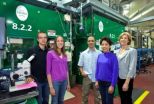(Press-News.org) DURHAM, N.C. – Drug companies may be more willing to develop treatments for neglected diseases including malaria, tuberculosis and leishmanaiasis if the European Union would adopt a "priority review voucher" reward system.
The vouchers would give a company accelerated regulatory review of one of its other drugs as a reward for developing a treatment for a neglected disease.
Although these diseases affect more than 1 billion people, they occur most frequently in developing nations, providing little financial incentive for pharmaceutical companies to create and test new treatments.
Writing in the Sept. 11 issue of The Lancet, professor David Ridley of Duke University's Fuqua School of Business and Alfonso Calles-Sánchez, a patent expert with the Spanish Patent Office and former pharmaceutical policy maker at the European Commission, propose a European Union version of the priority review voucher system instituted in the United States in 2007.
The EU voucher would provide priority regulatory review through the European Medicines Agency, as well as accelerated pricing and reimbursement decisions by EU member states.
For example, "If you develop a new drug for malaria, your profitable cholesterol-lowering drug could go on the market a year earlier," global health philanthropist Bill Gates explained at the 2008 World Economic Forum in Davos. "This priority review could be worth hundreds of millions of dollars," Gates said.
The U.S. voucher was originally proposed by Ridley and Duke colleagues Jeff Moe and Henry Grabowski in a 2006 article in the journal Health Affairs. Legislation to create the U.S. priority review voucher system was sponsored by Sens. Sam Brownback and Sherrod Brown and authorized by Congress in 2007.
"By allowing a company to sell its profitable drug sooner, an EU voucher system also would increase the time during which the company could enjoy patent-protected sales," Calles-Sánchez said."The voucher would not, however, delay generics because it would not extend the patent expiration date."
A company that receives approval for a new neglected disease treatment in both the U.S. and EU could receive vouchers in both regions that, combined, could be worth hundreds of millions of dollars in additional sales of a future blockbuster product, the researchers estimate. Vouchers could be sold or transferred between companies, making them valuable as potential revenue sources or assets to make firms more attractive as buyout targets.
"Scientists are aware of molecules that could potentially treat neglected diseases, but they have been mostly unable to make a business case for spending millions of dollars testing those molecules," Ridley said. "A European voucher would provide a strong incentive for organizations to use their knowledge and resources to treat conditions that might otherwise be ignored."
Novartis received the first U.S. priority review voucher in 2009 following FDA approval of Coartem, a treatment for malaria. Several more companies have treatments in late-stage clinical testing that may qualify for vouchers.
"The U.S. voucher and other new incentives have motivated firms to begin clinical testing, but it will take several years for these treatments to reach patients. We expect another voucher to be awarded in the U.S. within the next five years, and after that we could see a new treatment every year," said Ridley. "Given the enormous burden of these diseases, the new treatments could relieve a lot of suffering."
"A European priority review voucher system, combined with the U.S. system, would provide an extraordinarily powerful incentive for companies to invest in treatments for neglected diseases," Calles-Sánchez added.
###
END
People who are better at simple physical acts such as gripping, walking, rising from a chair and balancing on one leg are more likely to live longer, according to a new study published on bmj.com today.
Measures of physical capability, such as grip strength, walking speed, chair rising time and standing balance ability, can predict mortality in older people living in the community, UK researchers found.
These measures are related to a person's ability to perform everyday tasks. There is growing interest in using such measures as simple screening tools to identify ...
Diagnostic errors are the most important causes of avoidable harm to patients in hospitals, warns a senior doctor on bmj.com today.
Dr Gordon Caldwell, a consultant physician at Worthing Hospital in Western Sussex argues that doctors need better facilities and sufficient time to make a correct diagnosis.
When a patient is admitted to hospital, the team of doctors formulate a "working diagnosis," he explains. At this point, the diagnosis is uncertain but the patient is treated as if the working diagnosis is correct.
"If over the next few days the patient gets better, ...
Imagine a war in which you are vastly outnumbered by an enemy that is utterly relentless – attacking you is all it does. The intro to another Terminator movie? No, just another day for microbes such as bacteria and archaea, which face a never-ending onslaught from viruses and invading strands of nucleic acid known as plasmids. To survive this onslaught, microbes deploy a variety of defense mechanisms, including an adaptive-type nucleic acid-based immune system that revolves around a genetic element known as CRISPR, which stands for Clustered Regularly Interspaced Short ...
Los Angeles, CA (September 7, 2010) – Joseph Stalin once claimed that a single death was a tragedy, but a million deaths was a statistic. New research from the Kellogg School of Management at Northwestern University validates this sentiment, confirming large-scale tragedies don't connect with people emotionally in the same way smaller tragedies do.
The new study, entitled "The Scope-Severity Paradox: Why doing more harm is judged to be less harmful," has been published in the current issue of Social Psychological and Personality Science (published by SAGE) and was conducted ...
CHAMPAIGN, Ill. — Vaccine manufacturers and public health decision-makers need to collaborate in a more efficient and effective manner not only to reduce the likelihood of supply shortages for pediatric vaccines but also to maximize community immunity by using vaccine doses to increase coverage, according to research published by a University of Illinois researcher who specializes in statistics and data analysis.
Sheldon H. Jacobson, a professor of computer science and the director of the simulation and optimization laboratory at Illinois, says that the Pediatric Vaccine ...
CAMBRIDGE, Mass. — For the first time, a team of MIT chemical engineers has observed single ions marching through a tiny carbon-nanotube channel. Such channels could be used as extremely sensitive detectors or as part of a new water-desalination system. They could also allow scientists to study chemical reactions at the single-molecule level.
Carbon nanotubes — tiny, hollow cylinders whose walls are lattices of carbon atoms — are about 10,000 times thinner than a human hair. Since their discovery nearly 20 years ago, researchers have experimented with them as batteries, ...
MADISON, WI, September 9, 2010 – Cotton growers can produce more cotton if they plant early, but not without irrigation. That's the finding of an article published in the September-October 2010 Agronomy Journal, a publication of the American Society of Agronomy.
Bill Pettigrew, a scientist with the USDA-Agricultural Research Service in Stoneville, Mississippi, tested the performance of cotton under irrigated and non-irrigated plots, with half the plots being planted early (first week of April) and half being planted in the more tradition time period, around the 1st week ...
HACKENSACK, N.J. (September 9, 2010) — Researchers from the John Theurer Cancer Center at Hackensack University Medical Center played an important role in a study that led to the Food & Drug Administration's (FDA) recent fast tracking of ipilimumab, a promising treatment for metastatic melanoma. The FDA based its decision largely on the results of a pivotal study published in the New England Journal of Medicine on August 19, 2010 – the same day the agency accepted Bristol-Myers Squibb's application for the drug's approval and granted the application priority review status.
Ipilimumab ...
The following highlights summarize research papers that have been recently published in Journal of Geophysical Research-Atmospheres (JGR-D) and Geophysical Research Letters (GRL).
In this release:
Landmass shape affects extent of Arctic sea ice
Estimating how much rain forests intercept
How compliant fault zones respond to nearby earthquakes
Measuring the rate of mountain building in New Zealand
Interplanetary magnetic field causes changes in the polar cap ionosphere
Oxygen and hydrogen follow different escape paths from Venus's atmosphere
Anyone ...
SAN FRANCISCO, CA – September 9, 2010 – Amyloid beta (Αβ) proteins, widely thought to cause Alzheimer's disease (AD), block the transport of vital cargoes inside brain cells. Scientists at the Gladstone Institute of Neurological Disease (GIND) have discovered that reducing the level of another protein, tau, can prevent Aβ from causing such traffic jams.
Neurons in the brain are connected to many other neurons through long processes called axons. Their functions depend on the transport of diverse cargoes up and down these important pipelines. Particularly ...

